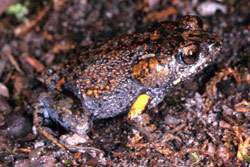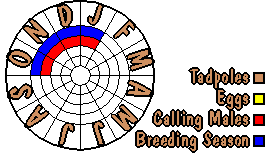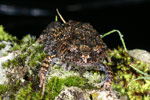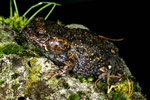Uperoleia martini
Martin's Toadlet

+ 57 kb Martin's Toadlet (Uperoleia martini)
A small to moderate sized ground dwelling species, this frog was only recently described. It inhabits coastal East Gippsland and adjoining areas of New South Wales.
Distribution and habitat

Adults are found in dry forest, woodlands, shrublands, grasslands, and open and disturbed areas. They are most common near water, but can be found in dry depressions that flood in winter or spring. Eggs are unknown. Tadpoles are aquatic but otherwise unknown.
There is a detailed distribution map available for: Victoria.
Calling
Males call from the pond edge or in low vegetation overhanging water. The call is a long creaking call - "aaaaaaaaaaaaaaaarrr" - lasting about a second, and repeated every two to three seconds.
Copyright Murray Littlejohn. Recorded by Murray Littlejohn. Must not be reproduced without permission.
Life cycle

Distinguishing characteristics
Adult
length: 30-35mm.
Eggs and tadpoles are unknown. Adults have a pronounced parotoid gland and a fully pigmented belly.
Visible features
Presented here is the information stored in the frogs.org.au database which is used to identify frogs based on their appearance. It is intended to be used in a key guide for separating species so some of the information (for example, back colours) may be rather non-specific. The system is currently being developed - if you notice errors in the data, please write to Dave Black at the address at the bottom of the page.
Important note: This information details only the appearance of the frog. If an "or" appears in the description, this may mean either that there is some variation within the species or that the feature might be observed differently by different people. For example, if a frog has very small toe pads, it may be listed as having "Toe pads: present or absent".
Size
Up to between 30mm and 60mm
Eyes, hands, and feet
Pupils: horizontal
Toe pads: absent
Webbing on feet: no webbing
Belly
Texture: smooth
Pattern: marbled or peppered
Colour: multi-coloured featuring a colour in addition to black, grey, and white
Back
Texture: rough or warty
Pattern: plain or spotted or mixed / marbled
Colour: single colour or multi-coloured
Glands and tubercles
Parotoid gland: present
Tibial gland: absent
Metatarsal tubercles: Non-keratinised glands present (fleshy or uncoloured)
Similar species (note: this version was written for Victorian species).
Distinguished from most other species by the presence of its large well-developed parotoid glands. This species may be distinguished from Philoria frosti by having both inner and outer metatarsal tubercles, and from Uperoleia laevigata by having a fully pigmented belly. It can only be distinguished from Uperoleia tyleri by its call.
The scientific names of Uperoleia martini
- Uperoleia martini (Davies & Littlejohn 1986)



